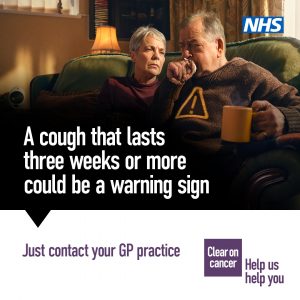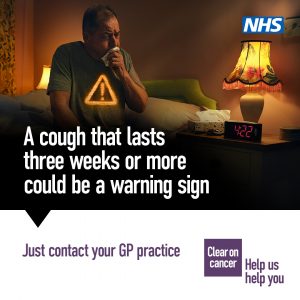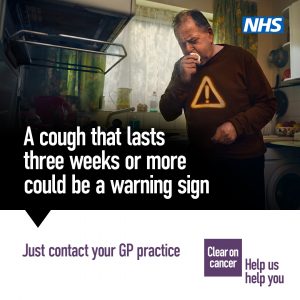Today, NHS England and NHS Improvement with support from Public Health England, are relaunching the ‘Help Us, Help You’ lung cancer campaign to encourage people with a cough lasting three weeks or more and who don’t have COVID-19, to contact their GP practice. As a result of the COVID-19 pandemic, some members of the public are reluctant to use NHS services, citing concerns about being exposed to the virus and not wanting to be a burden on the NHS. In addition, there is a lack of awareness that a cough for three weeks or more on its own can be a sign of lung cancer, and a need to remind the audience to act on a persistent cough and not wait to see if it resolves. While a cough for three weeks or more is probably nothing serious, it could be a sign of something that needs treatment. If it is cancer, finding it early makes it more treatable and can save lives.
Your NHS is here and wants to see you, Help Us Help You.
Visit nhs.uk/cancersymptoms for more information.
PRIMARY MESSAGES
- If you’ve had a cough for three weeks or more, and it isn’t COVID-19, it could still be a warning sign
- A cough for three weeks or more could be a sign of cancer. Just contact your GP Practice
- It’s probably nothing serious, but finding cancer early makes it more treatable
- Your NHS wants to hear from you
SECONDARY MESSAGES
If a friend or family member has been coughing for three weeks or more, and it isn’t COVID-19, encourage them to contact their GP practice
In addition to the symptom of a cough for three weeks or more, other symptoms of lung cancer include:
- Chest infections that keep coming back
- Coughing up blood
- A long-standing cough that gets worse
- An ache or pain when breathing or coughing
- Persistent breathlessness
- Persistent tiredness or lack of energy
- Loss of appetite or unexplained weight
KEY FACTS AND STATISTICS
LUNG CANCER SPECIFIC
- Lung cancer GP referrals remain lower than normal and have been the slowest of all cancer types to recover since the start of the pandemic. Lung cancer is the third most common cancer in England with around 39,300 cases diagnosed each year. Around 89% of those are aged 60 and over
- Lung cancer is England’s biggest cause of cancer death. Around 28,100 people die from lung cancer in England each year
- In 2018 lung cancer accounted for 12% of all cancer diagnoses in England6 and 20% of all cancer deaths
- Five-year survival for persons diagnosed with stage 1 lung cancer is 57% compared with just 3% for those diagnosed with late stage (stage 4) lung cancer
- Between 1995 and 2018, age-standardised incidence rates of lung cancer have increased from 51.4 per 100,000 to 67.0 per 100,000 for females. In males age standardised incidence rates of lung cancer have decreased from 127.9 per 100,000 to 85.5 per 100,000
- Between 2001 and 2018, age-standardised mortality rates of lung cancer have remained relatively stable between 44.8 per 100,000 and 44.5 per 100,000 for females. In males age-standardised mortality rates of lung cancer have decreased from 96.2 per 100,000 to 63.6 per 100,000
COVID-19 MESSAGING
- Our highest priority remains identifying those people with symptoms who have not yet come forward and getting them treated as quickly as possible by encouraging them to see their GP.
- The number of people coming forward and being referred with suspected cancer fell when COVID hit but is recovering. Referrals in March this year were at an all-time record high, and referrals have remained well above pre-pandemic levels in both April and May. We need referrals to remain high. 354,000 people have started cancer treatment since the pandemic began (March 2020 to May 2021).
- Our message to anyone worrying about potential cancer symptoms is clear – do not delay, help us to help you by coming forward for care. Staff continue to take all possible measures to ensure services are safe.
Early diagnosis and treatment of cancer can save lives



